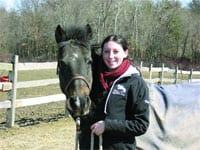Four-legged Therapists Horses Can Be Valuable Conduits for Physical and Emotional Healing
Michaelan Burke was 13, and her teen years were not getting off to the best of starts.
“I was getting abused by other students at school,” she said. “I was talking to a counselor at school, but no one was really doing anything for me.”
Until Flash came along.
“I just loved horses, and I had always wanted one,” Burke, now 20, told The Healthcare News. “I had been cleaning stalls on a backyard farm in exchange for lessons. I just loved being around them. By brushing horses and cleaning stalls, I proved to my mom that I could be responsible. A lot of kids get horses and don’t take care of them. It’s not like soccer, where you can just quit one day.”
Later that year, Burke adopted her own horse, Flash, who had been rescued from a neglectful situation. “I went into the paddock, and she was the cutest, sweetest thing I’d ever seen. I gave her some cookies, and from that moment on I was in love with her. She became my best friend.”
Burke was home-schooled after that, but to truly heal her emotional scars, she needed more than an escape from an abusive situation. As it turned out, she needed Flash — and the hours she would spend feeding her, walking her, brushing her tail, and just sitting in the sun together.
“She was my escape from everything,” Burke said. “It was just her presence. She’d whinny every time I came up to the fence, and that recognition tugged at my heart. I would spend time with her every day; she was a perfect friend, like a big dog.”
And more important: “Flash was my therapy,” she said. “I can’t imagine that time without her.”
Mane Events
Burke’s experience is far from unique; mental health professionals have long recognized the benefits of domesticated animals — dogs and horses are the most commonly cited — in bringing about emotional healing.
So much so, in fact, that national organizations, such as the North American Riding for the Handicapped Assoc. (NARHA), have sprung up around the connection between horses and healing.
Indeed, the therapeutic value of riding and caring for horses has long been touted among equine enthusiasts, and in 1969 the NARHA was formed to promote such activities. With more than 700 member centers serving more than 38,600 children and adults, NARHA has strived to educate and support the equine-therapy community.
“We work will all different clients, some physically impaired, others cognitively impaired,” said Marcia Gross, director of Equus Therapeutic Horseback Riding Program in Williamstown, a NARHA-certified center. “Some people just ride for psychological reasons, because it’s a good boost in self-confidence.”
As a program that has been around for 26 years, Equus has logged plenty of success stories, with both children and adults, Gross added.
“We’ve had good results with clients. They’ve improved in a lot of different ways — balance, coordination, attention span. Depending on where they’re coming from, we try to craft a program to their needs.”
The needs are many. Proponents of therapeutic riding generally regard Liz Hartel of Denmark as one of the key figures in its development. Although polio impaired her mobility, she won a silver medal in dressage at the 1952 Olympics. Soon, centers for therapeutic riding sprang up in Europe, which led in turn to the spread of the concept in North America.
Today, NARHA-certified centers work with individuals with muscular dystrophy, cerebral palsy, visual impairment, Down syndrome, mental retardation, autism, multiple sclerosis, spina bifida, emotional issues, brain and spinal cord injuries, amputations, learning disabilities, deafness, and attention deficit disorder, to name a few conditions.
Last year, two NARHA centers even offered pilot therapeutic riding programs to wounded U.S. veterans — a program that proved so successful that Walter Reed Army Medical Center in Washington, D.C. is considering adding therapeutic riding to its rehabilitation program.
Gross isn’t surprised at how mastering a horse can help someone master what afflicts them.
“Many times with a disabled person, everything controls them, and they don’t have a lot of self-confidence,” she said. “But when they get on a horse and control this large animal, it’s very uplifting for them psychologically; they feel like, if they can do this, then they can do other things, too.”
That’s where the benefits gained around horses carries over into everyday life, she told The Healthcare News. “They have that confidence not only while riding, but outside the riding program as well.”
Back in the Saddle
That doesn’t surprise Julie Trevelyan, equine coordinator at Aspen Ranch, a residential treatment center for troubled teens in Utah.
“Using horses as a tool to promote emotional growth in struggling teenagers is a phenomenon gaining numbers and national recognition,” she recently wrote for the National Youth Network Web site (www.nationalyouth.com).
“Many of our students arrive here without prior horse background, which does not matter,” she continued. “By relating their experiences with the horses to other people and issues in their lives, our students can begin to examine their negative behaviors and understand how to change them into positive behaviors.”
That’s because a relationship with a horse can strikingly mirror that between two people — often uncomfortably so, said Trevelyan, who called horses the most honest of creatures.
“A horse’s inability to lie can be invaluable in seeing what a student may be attempting to hide or manipulate,” she wrote. “Horses’ body language, by which they communicate 99{06cf2b9696b159f874511d23dbc893eb1ac83014175ed30550cfff22781411e5} of their feelings and actions, can reveal a student’s real self and begin to break down barriers and communication blocks.”
Burke knows something about finding herself, with the help of Flash. And she has made horses her life in more than one way. As a student in the Equine Industries program at UMass Amherst, she’s considering a customized degree with a concentration in Equine Marketing.
It will require her to write up a proposal, come up with a list of classes, and find faculty sponsorship. Such an academic path would seem to make sense for Burke, especially in the Northeast, which boasts a solid concentration of animal-related businesses.
She also wants to become certified as a riding instructor — a path that could possibly find her helping young people who need a friend as much as she did once.
“Coming to the farm at the end of the day is a good way to get away from everything,” Burke said. “Riding de-stresses me. It’s just like therapy.”
Horse lovers everywhere know just what she’s talking about.



Comments are closed.